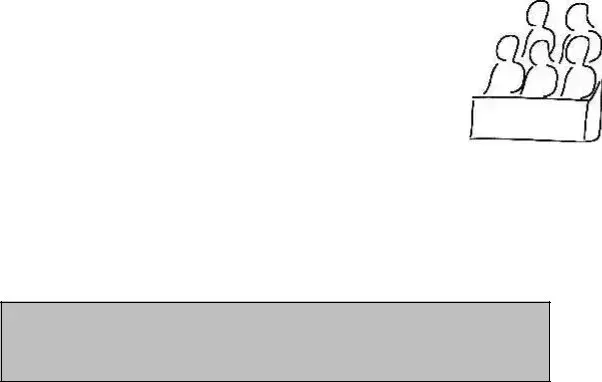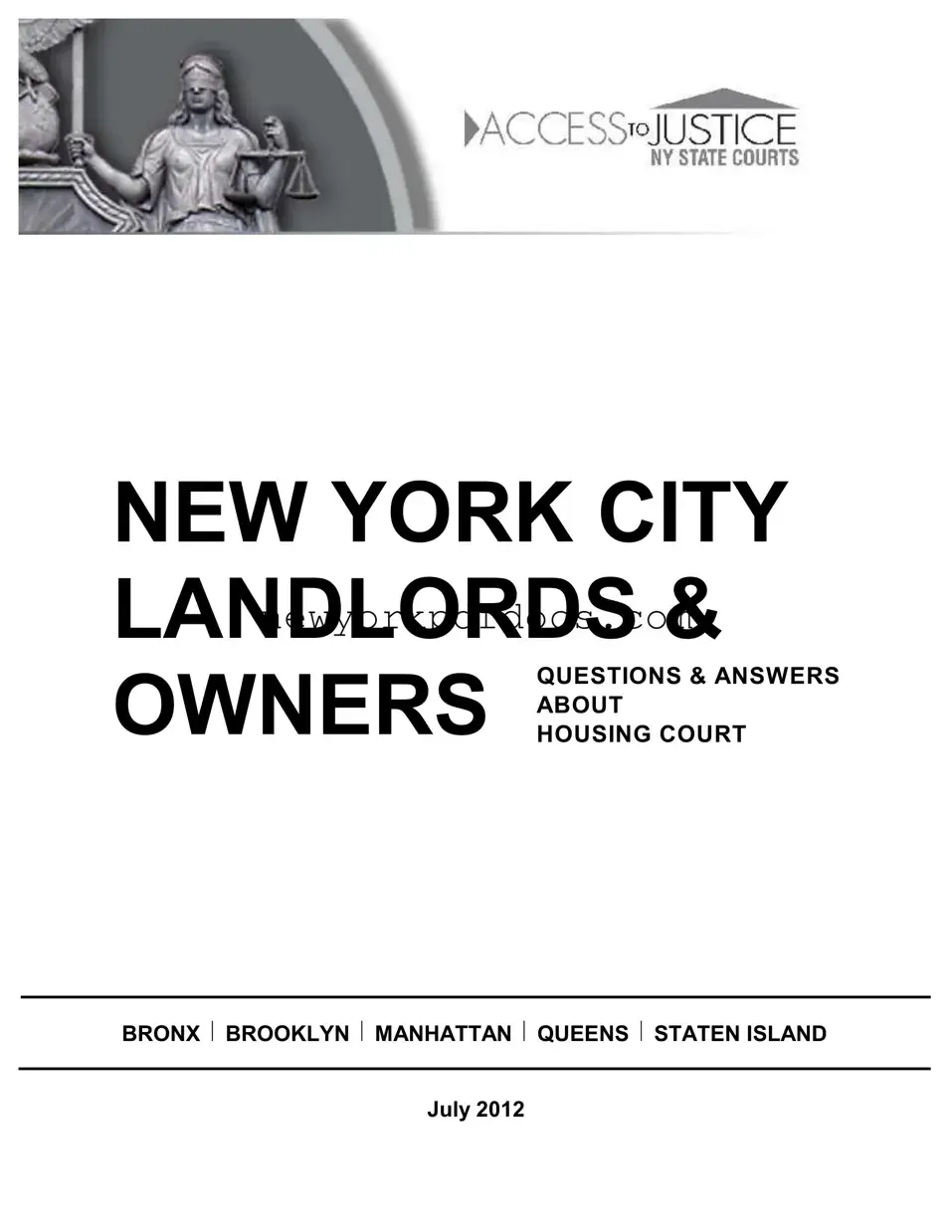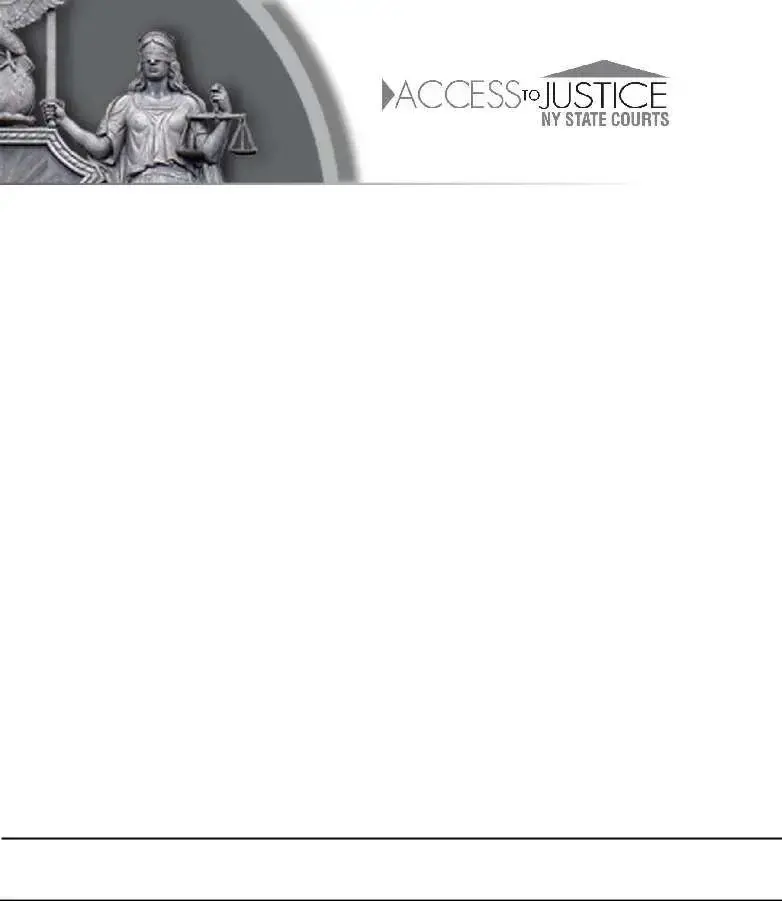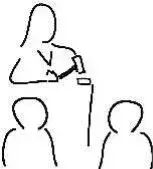NEW YORK CITY LANDLORDS &
QUESTIONS & ANSWERS |
OWNERS HOUSINGABOUT |
COURT |
BRONX # BROOKLYN # MANHATTAN # QUEENS # STATEN ISLAND

Table of Contents
What is Housing Court?.. . . . . . . . . . . . . . . . . . . . . . . . . . . . . . . . . . . . . . . . . . . 1
What do I do if the tenant is not paying me rent? (nonpayment). . . . . . . . . . . 3
How do I evict someone for a reason other than rent? (holdover). . . . . . . . . . 8
How do I make a roommate leave a home that we share?. . . . . . . . . . . . . . . 12
What if the tenant starts a case against me for harassment?. . . . . . . . . . . . 13 What if a case is started against me for housing repairs? . . . . . . . . . . . . . . . . . . 14
What happens if a case is started against me saying that I
locked the tenant out illegally? . . . . . . . . . . . . . . . . . . . . . . . . . . . . . . . . . . . . 15
How are legal papers delivered? (service) .. . . . . . . . . . . . . . . . . . . . . . . . . . . 16
What do I do when I go to court?. . . . . . . . . . . . . . . . . . . . . . . . . . . . . . . . . . . 19
Can the tenant and I agree to settle the case?. . . . . . . . . . . . . . . . . . . . . . . . 21
What happens at a trial?. . . . . . . . . . . . . . . . . . . . . . . . . . . . . . . . . . . . . . . . . . 23 How do I appeal if I lose the case?. . . . . . . . . . . . . . . . . . . . . . . . . . . . . . . . . . 24 How do I evict the tenant after I have a judgment?. . . . . . . . . . . . . . . . . . . . . 25
What do I do if I need to go back to court to ask the Judge to
do something on the case? (order to show cause). . . . . . . . . . . . . . . . . . . . . . 26
Where are the Housing Courts located?. . . . . . . . . . . . . . . . . . . . . . . . . . . . . 27
Where can I go for help?. . . . . . . . . . . . . . . . . . . . . . . . . . . . . . . . . . . . . . . . . . 28
People who don’t have a lawyer are called “Pro Se” or “Self-
Represented” or “Unrepresented” litigants.
What is Housing Court?
The New York City Housing Court is a Part of the Civil Court where landlords/owners and tenants go to solve their housing problems.
Landlords/owners start cases in Housing Court to:
•collect rent, and to
•evict tenants and roommates.
Tenants start cases in Housing Court to:
•get repairs,
•move back in after an eviction, or to
•stop harassment by the landlord/owner.
A Housing Court Judge can order:
•rent to be paid,
•a tenant out of an apartment,
•a tenant back in the apartment,
•repairs, or
•money due to the tenant from the landlord/owner on counterclaims.
Can I change my tenant’s locks, or turn off the heat, water or electricity to force the tenant to move?
No!
Is there a way to solve my problem without going to court?
Yes. You do not have to go to court for all your housing problems. Many problems are solved by talking to your tenant. You can go to a local community mediation center for help with the problems or to help you talk to your tenant. You can find the location of a community dispute resolution center near you in the phonebook or on the internet.
Does Housing Court charge any court fees?
Yes. Possible fees:
•It costs $45.00 to start a case.
•It costs $70.00 if you ask for a jury trial.
Fees must be paid by cash, or certified check, money order or bank check made out to the “The Clerk of the Court.” Personal checks are not accepted.
What if I don’t speak English well?
Tell the Clerk when you go to court that you need an interpreter. The Clerk will assign an “official” interpreter for free.

Is the court going to give me a free lawyer?
No. There is no right to a lawyer in a Housing Court case.
What if I am homebound and can’t come to court?
The landlord/owner must come to court to prove the case. Someone else can bring the papers to court to start a case for you, but that person can’t settle or go to trial for you, even if he or she has your power of attorney. You can ask the court to appoint a guardian ad litem to act on your behalf. It is best to hire a lawyer.
What if I can’t come to court on the date I was given and need a new date?
You can’t call the court to get a new date no matter what the reason. You can ask the tenant to agree to a new date. If the tenant agrees, get this in writing and bring it to the Court Clerk before your original court date.
If the tenant won’t agree to a new court date:
•write a letter to the Judge or get an affidavit of unavailability from the Clerk to explain why you can’t be there and bring it and copies of any papers that explain why you can’t come (plane ticket, hospital appointment slip) to the Court Clerk before the court date, or
•send someone to court on your court date to tell the Judge why you can’t be there.
Warning! If you send someone to court, or write a letter, the Judge may not agree to give you a new date and you may lose the case.
Who decides cases in Housing Court?
Cases are usually decided by Judges without a jury. You or the tenant can ask for a jury trial if your lease doesn’t prevent it or if you have no lease. You can file a jury demand and pay the jury fee at any time before the trial.
The tenant can ask the Judge to file a late jury demand, but the
Judge may say no.
Where do I find more information about Housing Court?
All of the information in this guide is also on the Housing Court’s website. On the website there are free court forms, helpful how-to videos and more detailed information to help you represent yourself in court. If you have the internet, visit the Housing Court’s website.
•If you start a case in Housing Court you are the petitioner.
•If a case is started against you in Housing Court you are the respondent.
What do I do if the tenant is not paying me rent?
If the tenant is not paying, you can start a nonpayment case to sue the tenant for rent. In a nonpayment case you ask the court to evict the tenant if the tenant doesn’t pay.
Can I start a nonpayment case if the tenant moved out?
No. You can’t start a nonpayment case in the Housing Court if the tenant has left the home for good by giving you back the keys or letting you know in writing. You can start a civil or small claims case for the money in the Civil Court.
What do I do if the home is illegal?
If the home is not legal, for example, you turned the basement into an apartment, you won’t be able to get rent money back in a nonpayment case. You can start a holdover case to evict the tenant. See page 8, How do I evict someone for a reason other than rent?
Do I have to do anything before starting a case?
Yes. The tenant must be asked for the rent first. This is called a rent demand. It warns the tenant that you want the rent, and that if the tenant doesn’t pay, the tenant can be evicted. The rent demand must tell the tenant the months and amounts of rent that the tenant owes. Also list additional rent, like water charges or taxes, that the lease says you can collect.
The rent demand can be:
•said to the tenant (oral demand), or
•written to the tenant (written demand).
Is there anything special I have to do if I have a Section 8 tenant?
Yes. There are special rules for Section 8 tenants. Read your contract before starting a case.
How do I make an oral rent demand?
You, or someone who works for you, must ask the tenant for the rent. Check your lease because it may say that you have to give the tenant a written rent demand.
How do I make a written rent demand?
A written rent demand must be sent to the tenant at least three days before you can start the case. But check your lease it may say that you have to give the tenant more than three days’ notice.
If the tenant’s home is not rent regulated you can use the court’s free DIY (Do-It- Yourself) Form program to make a written rent demand. The DIY program can be used in the courthouse or on the internet. You can buy a rent demand form over the internet or at a legal stationery store, like Blumberg.
Is there a special way that the written rent demand must be given to the tenant?
Yes. The written rent demand must be given to the tenant the right way. This is called service. If you don’t serve the tenant the right way the Judge may make you start all over again. See page 16, How are legal papers delivered?
What do I do if the tenant doesn’t pay the rent after I give the tenant a rent demand?
If the tenant doesn’t pay the rent by the date requested you can start a nonpayment case in Housing Court.
How do I start a nonpayment case against the tenant?
A nonpayment case in Housing Court is started with court papers called a Notice of Petition and Petition. The court papers tell the tenant that he or she has 5 days to come to court and answer the Petition.
If the tenant’s home is not rent regulated it may be easier to use the court’s free DIY (Do-It-Yourself) Form program to make your court papers to start a nonpayment case. The DIY program can be used in the courthouse or on the internet. The DIY program gives you instructions on what to do next. You can buy a Notice of Petition and Petition online or at a legal stationery store, like Blumberg. After you fill out the papers, you have to sign them in front of a notary and then bring them to the Housing Court.
If there is more than one person living there, who do I list as the respondent in the Notice of Petition and Petition?
You have to list all the adults that are 18 years old or older on the Notice of Petition and Petition. If you don’t know the name of someone living there you should list him or her as John or Jane Doe.
Who do I list as the Petitioner in the Notice of Petition and Petition?
A person who owns the property and is listed on the deed can be the petitioner that starts the case. If there is more than one owner of the property, only one person needs to be listed as the petitioner.*
A tenant that sublets the home can be listed as the petitioner in the Notice of Petition and Petition.
Other people, like a friend or relative, can’t be the petitioner instead of you.
*The person listed as the petitioner has to com e to court.
Where do I start the case?
The case must be started in the county where the home is located. See page 27, Where are Housing Courts located?
What happens when I go to court to start the case?
Before you go to the courthouse make copies of the Notice of Petition and Petition and the rent demand if you made one in writing and the Affidavit of Service of the rent demand. Give the papers to the Clerk and pay the filing fee. The Clerk can tell you how to set-up the papers. Now the papers need to be given to the tenant.
Is there a special way that the Notice of Petition and Petition must be given to the tenant?
Yes. The Notice of Petition and Petition must be given to the tenant the right way and you can’t deliver the papers. This is called service of papers. If you don’t serve the tenant the right way the Judge may make you start all over again. See page 16, How are legal papers delivered?
What do I do after the Notice of Petition and Petition are given to the tenant?
After service of the court papers, and any mailings, you must bring back the original Notice of Petition and the Affidavit of Service to the Clerk’s Office within 3 days of the mailing or hand delivery of the papers. Bring stamps for postcards with you to give to the Clerk. The Clerk will mail a postcard to the tenant that says that you started a court case. The tenant will then have to answer the Petition.
When do I get a court date?
The tenant has 5 days after getting the court papers to go to court to Answer the Petition. When the tenant answers, the court will send you a court date. The court date is usually a week later. You must be in court on your court date and be on time.
You will also get a copy of the tenant’s Answer. An Answer says the legal reasons that the tenant thinks he or she does not owe all or part of the rent. The legal reasons are called defenses. The tenant has to prove the defenses in court.
Can the tenant make a claim against me in the Answer?
Yes. The tenant may add “counterclaims,” to the Answer. A counterclaim is a claim that the tenant may have against you. In a counterclaim the tenant is asking the court to order you to pay the tenant money. If the tenant’s answer has a counterclaim, you should answer the counterclaim.
What happens if the tenant does not answer the Petition?
If the tenant doesn’t answer the Notice of Petition before the deadline, and doesn’t pay the rent, you can get a judgment on default and a warrant of eviction to evict the tenant. See page 25, How do I evict the tenant after a judgment?
Warning: If the tenant was not served with the court papers by personal delivery (see page 16, How are legal papers delivered?) you can’t get a judgment for the money you are owed. You can only get a judgment to evict the tenant. You can start a civil case for the money.
Can the tenant and I settle the case?
Yes. Most nonpayment cases never go to trial and are settled by a Stipulation of Settlement, often called a Stip. See page 21, Can the tenant and I agree to settle the case?
What do I need to bring to court?
Bring proof of the rent amount and rent payments, including:
•lease and lease renewals,
•records of rent payments,
•agreements by the tenant to pay for improvements,
•copies of rent increases from government agencies,
•the deed, and
•the multiple dwelling registration if the building is a multiple dwelling.
What happens if the tenant doesn’t come to court?
If the tenant doesn’t come to court on the court date, and hasn’t paid the rent, the Judge will give you a judgment on default. See page 25, How do I evict the tenant after I have a judgment?
What happens if the tenant says I didn’t make repairs or give services?
The tenant may ask the court for an Inspection to show the repair problem in the home. Someone from the Department of Housing Preservation and Development goes to the tenant’s home to inspect. You can be there for the inspection. The Judge can also send a court employee to visit the tenant’s home and report back. The case will be postponed in court until the inspection or visit is finished.
If the Judge finds at the trial that the repairs were very serious, and that living without them hurt the tenant, the Judge may lower the amount of money the tenant owes you. This is called a rent abatement. The Judge can also order you to make repairs.
My tenant owes me rent from a long time ago, what can happen?
A Judge may not let you evict a tenant for rent owed in a nonpayment case if it is from a long time ago, like more than six months, and you never talked about it with the tenant. The Judge may give you a money judgment for the old rent or tell you to sue the tenant in a small claims or civil case.
What happens if the Judge holds a trial and decides that the tenant owes me rent?
The Judge will decide the amount that the tenant owes you and that amount will be put in a judgment. The tenant has 5 days to pay you that amount.
If the tenant pays, the case is over and you can’t evict the tenant. You need to give the tenant and the Court a Satisfaction of Judgment. A Satisfaction of Judgment tells the Court that the money was paid.
What happens if the tenant doesn’t pay the amount owed in the judgment? You can use the judgment to get a warrant to evict the tenant. See page 25, How do I evict the tenant after I have a judgment?
What happens if the tenant wants to pay me all the money and stay in the home after I get a Notice of Eviction?
That is up to you. You don’t have to let the tenant stay.
How do I evict someone for a reason other than rent?
You can start a holdover case in Housing Court to evict a tenant or another person (also called an occupant). A holdover case is started for a different reason than nonpayment of rent.
Do I need a reason to evict a tenant that I don’t like?
Not if the lease has ended or if the tenant has no lease. If the lease is not over you must have a legal reason to evict the tenant, like the tenant did something that is not allowed by the lease.
What do I have to do before I can start a holdover case?
Nothing if the lease has ended and you haven’t taken any rent after the end of the lease. But, if the lease has not ended you must give (serve) the tenant a written notice before you can start a case. If the tenant or occupant has no lease you must give (serve) the tenant a written notice.
There are different written notices and you must give the tenant the right one. The written notices are called a Notice to Cure, a Notice to Quit, and a Notice of Termination.
My tenant has done something that is not allowed by the lease, what notice do I have to serve?
If the tenant has done something that is not allowed by the lease like, has a pet, or has a washing machine, or is too loud all the time, you must give the tenant a written notice called a Notice to Cure. The Notice to Cure tells the tenant what he or she is doing wrong and gives the tenant 10 days to fix the problem.
Important! If the tenant doesn’t correct the problem by the deadline in the notice, you must give the tenant a second written notice called a Notice of Termination before you can start a case.
My tenant never had a lease, and is supposed to pay me every week or every month, what notice do I have to serve?
A Notice of Termination. You do not serve a Notice to Cure.
What is a Notice of Termination?
ANotice of Termination is given to a tenant to end the tenancy. The notice tells the tenant:
•the reason,
•the date that the tenant must move, and
•that a case will be started if the tenant doesn’t move by the deadline.





